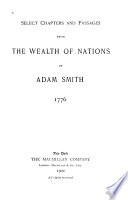 The property which every man has in his own labour, as it is the original foundation of all other property, so it is the most sacred and inviolable. The patrimony of a poor man lies in the strength and dexterity of his hands; and to hinder him from employing... The property which every man has in his own labour, as it is the original foundation of all other property, so it is the most sacred and inviolable. The patrimony of a poor man lies in the strength and dexterity of his hands; and to hinder him from employing...  Blackwood's Edinburgh Magazine - Page 1731856Full view Blackwood's Edinburgh Magazine - Page 1731856Full view - About this book
 | Adams Sherman Hill - 1893 - 324 pages
...of the sentence. • , " The property which every man has in his own labor, as it is the' '^''^i',, original foundation of all other property, so it is the most sacred :± and inviolable." 4 " This was the most metaphorical speech which Thomas of Gilsland was ever known to utter, the rather,... | |
 | Adam Smith - 1894 - 526 pages
...Manchester, Birmingham and Wolverhampton are, many of them, upon this account, not within the statute. . . . The property which every man has in his own labour,...dexterity of his hands ; and to hinder him from employing this strength and dexterity in what manner he thinks proper without injury to his neighbour, is a plain... | |
 | Susan Lehrer - 1987 - 332 pages
...of laissezfaire as well. As one decision stated: The property which every man has in his own labor, as it is the original foundation of all other property,...is the most sacred and inviolable. The patrimony of the poor man lies in the strength and dexterity of his own hands; and to hinder him from employing... | |
 | Herbert Hovenkamp - 2009 - 470 pages
...whom he quoted in his opinion: "The property which every man has in his own labor," says Adam Smith, "as it is the original foundation of all other property,...is the most sacred and inviolable. The patrimony of the poor man lies in the strength and dexterity of his own hands; and to hinder him from employing... | |
 | John Cunningham Wood - 1987 - 640 pages
...the market for private gain. Labour, whether skilled or unskilled, was one form of private property. The patrimony of a poor man lies in the strength and...dexterity of his hands; and to hinder him from employing this strength and dexterity in what manner he thinks proper without injury to his neighbour is a plain... | |
 | Peter Minowitz - 1993 - 376 pages
...liberty and justice is established partly by a Lockean-sounding argument about property and labor: "The property which every man has in his own labour,...property, so it is the most sacred and inviolable" (WN Ixci2). This appears to be a restatement of the famous claim, in Locke's chapter on property, that... | |
 | Pierre Guillet de Monthoux - 1993 - 334 pages
...distorted the market but also undermined the natural entrepreneurship that was the basis of property: "The property which every man has in his own labour,...original foundation of all other property, so it is most sacred and inviolable. The patrimony of the poor man lies in the strength and dexterity of his... | |
 | Frank H. Brooks - 1994 - 350 pages
...which declares, in the words of Adam Smith, that "the property which each man has in his own labor, as it is the original foundation of all other property, so it is the most sacred and inviolable." They defend their property on the assumption that it is acquired under the same conditions as the right... | |
 | Stephen Innes - 1995 - 432 pages
...restrictions on free competition. Espousing the LockePetty labor theory of property, he declared that The property which every man has in his own labour,...dexterity of his hands; and to hinder him from employing this strength and dexterity in what manner he thinks proper without injury to his neighbor is a plain... | |
 | Samuel M. Natale, Brian M. Rothschild, Joseph W. Sora, Tara M. Madden - 1995 - 348 pages
...Edel, Aristotle and His Philosophy, p. 21 7. 28. "The property which every man has is his own labor, as it is the original foundation of all other property,...dexterity of his hands; and to hinder him from employing this strength and dexterity in what manner he thinks proper without injury to his neighbor, is a plain... | |
| |